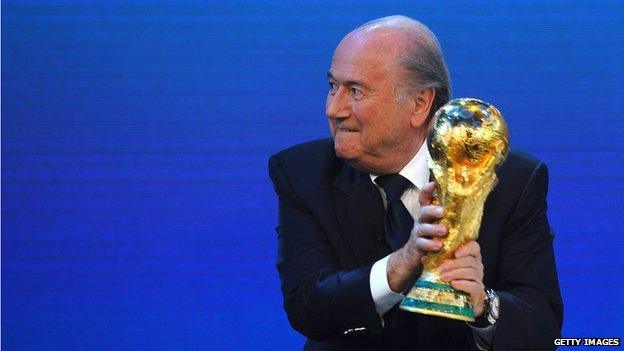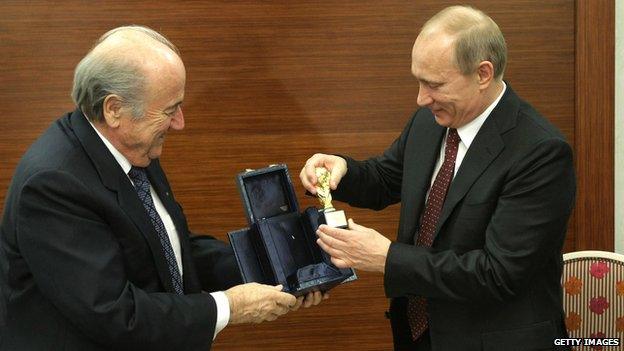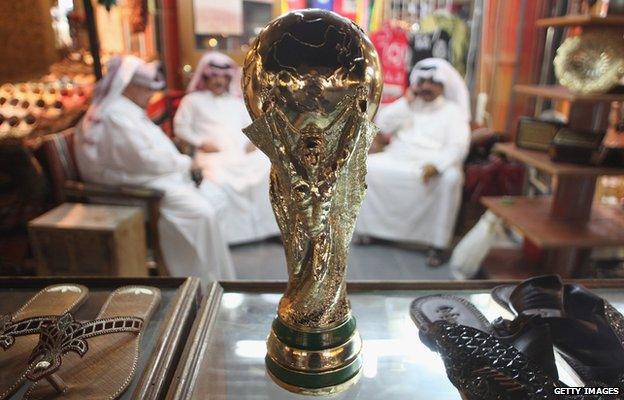Could Fifa really take the World Cup from Russia or Qatar?
- Published

Sepp Blatter could hold the key to the 2018 and 2022 World Cup locations
Following Fifa's head of audit and compliance Dominico Scala's remarks that it was feasible for Fifa to strip a nation of the World Cup if corruption was proved, we examine exactly how this would work.
What needs to happen for them to lose the World Cup?
Proof needs to be found that it was obtained by corrupt means. This would need to be a "smoking gun", and ideally proven as part of a criminal investigation. The consequences are so great - legal, financial, diplomatic - that nothing short of absolute proof would do.
How would they do it?
Essentially, Fifa's Executive Committee (the organisation's most powerful body) is the only body which can make this call.
This is unprecedented territory and it all comes down to the interpretation of Fifa's rules. There is no obvious reference to corruption but there is a general clause for "unforeseen circumstances" that could be used. The problem then is defining corruption as "unforeseen circumstances," - leaving it open to interpretation what the burden of proof or level of corruption is required.

Article 85 - the clause that could decide the World Cup
How soon?
The earliest it could happen would be at the Extraordinary Congress called to vote on Sepp Blatter's replacement as president. The BBC understands that this is likely to be held on 16 December.
Does Sepp Blatter have a say?
For now. As long as he remains president he could trigger a vote on it. The odds are that the Executive Committee will follow what he says, they normally have in the past.
His successor could also announce their arrival by asking for a vote on withdrawing the rights to host the World Cup. However, it would be a bold move to make your first decision one that could potentially destroy your organisation.
How would it work?
In theory, very simply. Fifa would say it was tearing up the contract due to corruption. That would be quick, as long as Qatar or Russia accepted it. The problem is - they almost certainly wouldn't.
So, then it would move to legal wrangling, and the injured party would appeal to the Court of Arbitration for Sport (CAS). This would not be a quick process, with several unknowns.
Would CAS halt the process of removing the right to host whilst it heard the case, leaving the bid in limbo? And would whoever lost out at CAS, then appeal again to a higher Swiss court?
This is so unprecedented we simply do not know.

The World Cup is seen as one of Vladimir Putin's personal projects
Could Russia lose the 2018 World Cup?
Time more than anything means that in all likelihood Russia will keep the 2018 World Cup.
The ball is already rolling and the draw for qualifying takes place in less than two months. If Russia were to be stripped of the tournament it would be in 2016 at the earliest, probably later. Television is the financial power behind the World Cup and by 2016 broadcasters will be starting to make detailed plans. Uncertainty is the last thing they want - this more than anything means Fifa is unlikely to make a change.
Finding a replacement host at short notice would also be difficult. Nations such as Germany or England could host it quickly but would still need to upgrade many of their stadiums. In England, probably only Wembley and Arsenal's Emirates stadium fully meet Fifa's specifications. The rest would need investment to upgrade things such as broadcast facilities - certainly not impossible, but potentially time consuming and expensive.
In addition to stadiums, a host nation would have to be ready for one million visiting fans, possibly more if it was held in central Europe. Would small cities really be able to handle 50,000 fans requiring bed and board at short notice? Fifa would also require hundreds of hotel rooms for it and "members of the football family".
Even last year's hosts Brazil would struggle. Much of the infrastructure there was temporary - the Estadio Nacional Mane Garrincha stadium in capital Brasilia is now a bus park.

Sources: Stadium DB, external / media reports.
Could Qatar lose the 2022 World Cup?
In practical terms - yes. There is enough time before 2022 to find a new host, quite possibly one of the original bidders in the form of the US, or Australia.
Legally - nobody really knows. The Qataris are bullish and will fight any move to take the tournament away from them with every legal resource at their disposal.
However, the strength of their response to the corruption scandal suggests they must be nervous - and with Swiss and American criminal investigations examining their bid, they would be foolish not to be.

Qatar's World Cup will be the most expensive ever

* As outlined in original bid. In 2014 it was reported that Qatar could scale back plans to 8 or 9 stadiums.
What about the money?
Fifa has $1.5bn (£690m) in cash reserves and is an immensely powerful organisation, but it is going up against two nation-states. Both hosts have invested eye-watering sums of money into the tournament; Qatar is quite literally building cities to hold stadiums.
Russian Prime Minister Dmitry Medvedev has estimated the cost of the Russian tournament at £13bn ($20bn). Qatar says its cost will be at least £23bn ($35bn). If a World Cup was removed from a host country which then successfully appealed and won compensation, Fifa could well be bankrupted.
Diplomatic incident?
Forget about the money, part of the allure of hosting a World Cup is prestige, a way of announcing yourself on the world stage. Qatar has systematically used sport to build itself as a global brand. It owns Paris St-Germain and sponsors European champions Barcelona; the World Cup was the final part of the jigsaw. For Qatar to be stripped of it in a mire of corruption would be humiliating. It would almost certainly damage its relations with the West, where it is a major investor.
Russia is even more fraught. President Vladimir Putin has already described the US Department of Justice's corruption investigation as a Western plot to strip Russia of a World Cup. The countries that could all host at very short notice - Germany, Britain and the US - all currently have sanctions targeting Russia over the crisis in Ukraine. For the tournament to be taken away from Russia and handed to one of them would have enormous diplomatic ramifications.